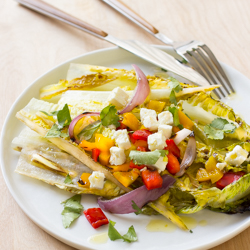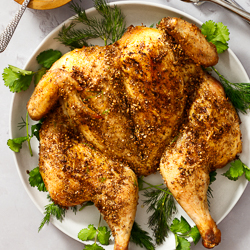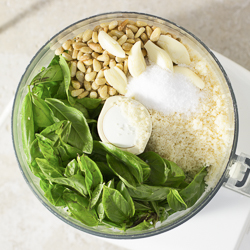Lately, I’ve been making huge grain salads, jam-packed with veggies and herbs, and enjoying over them successive days for lunch. Sometimes I arrange a sliced, hard-cooked egg and a plop of mayonnaise on top, and sometimes I add bits of cooked chicken from last night’s dinner. Other times I have my salad straight out of the container, deliciously on its own.
My grain of choice these days is farro. I love its bigger-than-average size and tantalizingly chewy texture. But really, anything works for a salad like this. Whatever’s in the cupboard.
Cooking grains, however, can be challenging. Traditionally, you cook them like rice, where the object of the game is to start with just enough water that it’s perfectly cooked off at the exact moment the grains are tender.
Adding to the challenge, different grains need different cooking times and, therefore, different amounts of water.

So instead of stressing, I recommend cooking grains like you cook pasta. Here’s how:
1. Place the grains in a saucepan with at least three times as much water.
So for 1 cup of grains, use at least 3 cups of water.
2. Add a generous pinch of salt.
This will help season them through and through.
3. Bring the water to a boil over medium-high heat, then lower to a simmer.
I have an editor that always used to ask, “You mean turn the heat to low?” And I’d say, “No. Turn the heat to whatever maintains the simmer.” It’ll be different settings for different stoves, saucepans, and amounts of grains and water.
4. Partially cover, then cook until the grains are tender.
It’ll take about 20 minutes for smaller grains like quinoa and amaranth and 1 1/2 hours or more for larger ones like wheat berries and farro. You can shorten the cooking time by soaking the grains in water overnight (then draining and boiling with fresh water). According to my co-author for The Clean Plates Cookbook, soaking grains before cooking also helps with both mineral absorption and digestion.
5. Drain the grains, then use them however you like.
For example, in my Summer Farro Salad (pictured, here’s the recipe).
No stress, and great grains every time.










